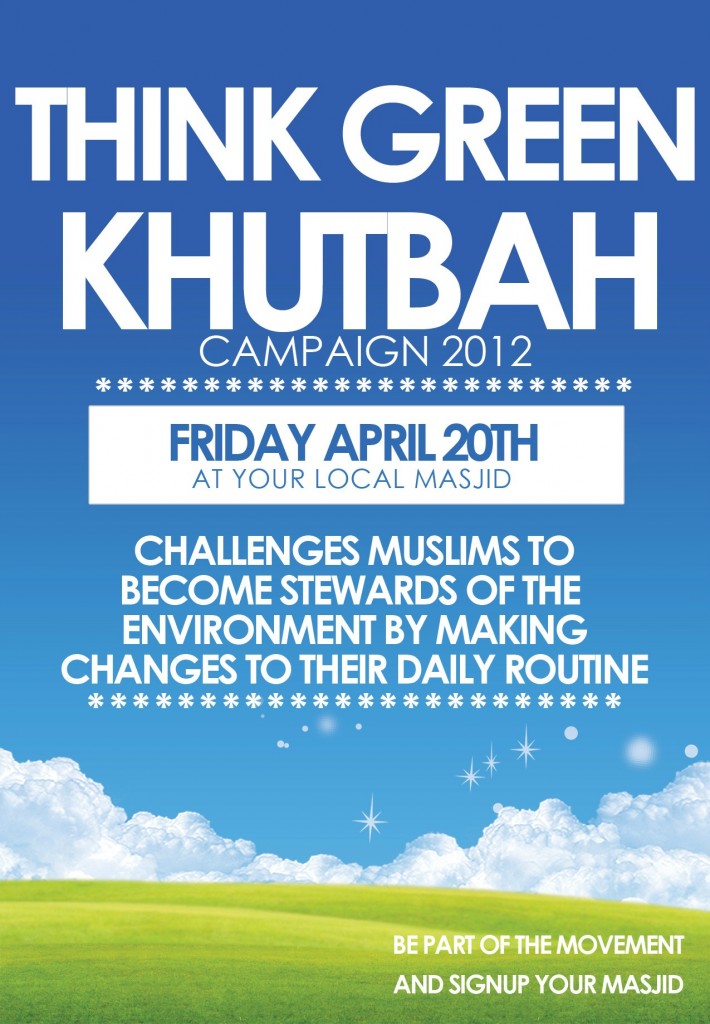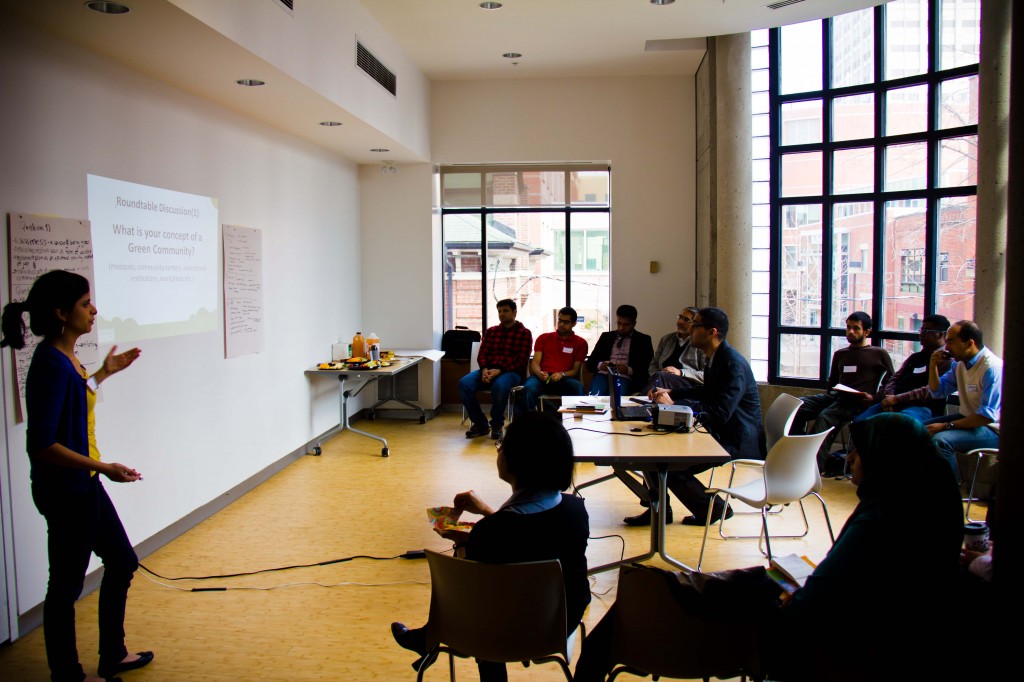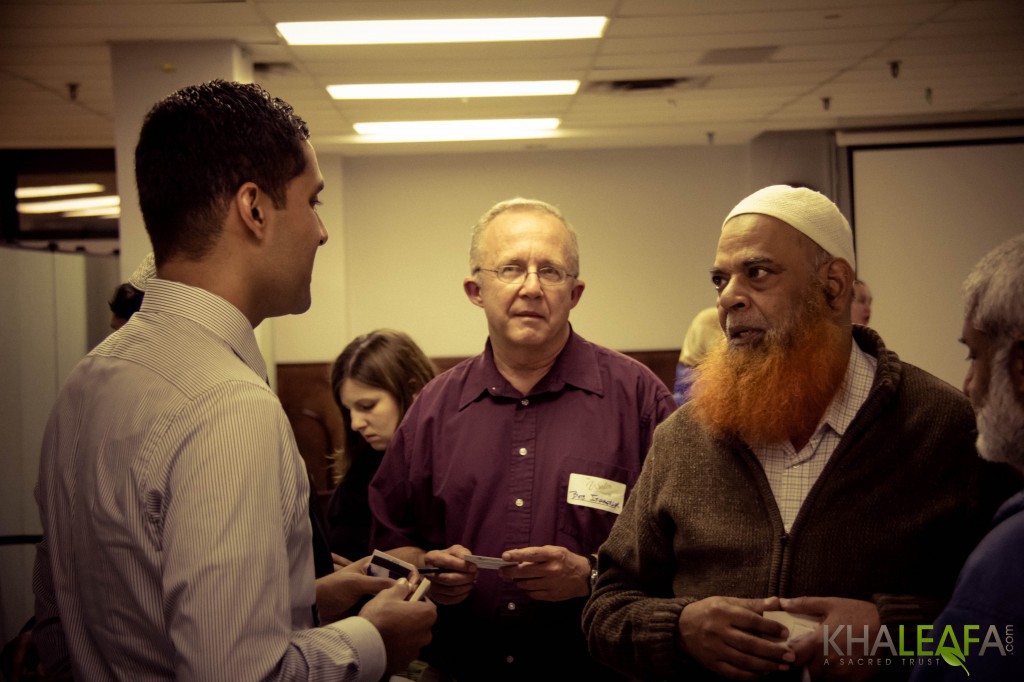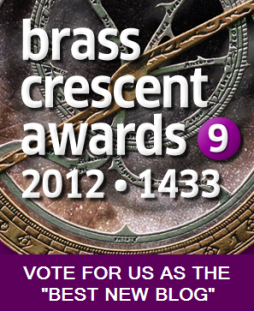As we enter a new yea r with new beginnings, I thought I would take the first post to highlight some of the accomplishments of Khaleafa.com over the past year and set the stage for some upcoming initiatives that we have planned for 2013. We have grown by leaps and bounds over the last year, and I would like to thank all of you for your continued support and encouragement in raising the profile of environmentalism within our community.
The Green Khutbah Campaign was launched this past spring to coincide with Earth Day. The goal was to encourage mosques, schools and Islamic Institutions across North America to devote their Friday Khutbah to raise awareness on the environmental challenges facing humanity. The campaign garnered the support of over 75 Imams/Organizations across North America, Europe and Africa and quickly went viral over the course of two weeks. This coming year we are planning to expand on the initiative and will be working with several organizations to carry the message out to a broader audience.
r with new beginnings, I thought I would take the first post to highlight some of the accomplishments of Khaleafa.com over the past year and set the stage for some upcoming initiatives that we have planned for 2013. We have grown by leaps and bounds over the last year, and I would like to thank all of you for your continued support and encouragement in raising the profile of environmentalism within our community.
The Green Khutbah Campaign was launched this past spring to coincide with Earth Day. The goal was to encourage mosques, schools and Islamic Institutions across North America to devote their Friday Khutbah to raise awareness on the environmental challenges facing humanity. The campaign garnered the support of over 75 Imams/Organizations across North America, Europe and Africa and quickly went viral over the course of two weeks. This coming year we are planning to expand on the initiative and will be working with several organizations to carry the message out to a broader audience.
 The Think Green: Creating Sustainable Communities session brought together community activists to discuss what it means to be a green Muslim, as well as how to identify and implement environmental initiatives within a diverse community. The roundtable participants engaged in a lively discussion that covered issues such as the concept of a Green Community, the projects and initiatives they would like to see implemented and potential limitations that they may have experienced. What came out of the discussion was a framework on how to proceed and how the environmental message can be incorporated into our community.
The Think Green: Creating Sustainable Communities session brought together community activists to discuss what it means to be a green Muslim, as well as how to identify and implement environmental initiatives within a diverse community. The roundtable participants engaged in a lively discussion that covered issues such as the concept of a Green Community, the projects and initiatives they would like to see implemented and potential limitations that they may have experienced. What came out of the discussion was a framework on how to proceed and how the environmental message can be incorporated into our community.
 This summer the ISNA Youth Food Bank Committee and the experts from EcoSource partnered up for the first ISNA Mosque Community Planting Day. The joint venture took place at the Iceland Teaching Garden in Mississauga and involved weeding the community garden, mulching and tilling the site and planting vegetables for the upcoming season. Participants also learned about planting techniques, integrated pest management and the importance of locally grown, organic produce. The crop that is grown in this garden will be donated to the Eden Community Food Bank through the Mississauga Sustainable Agriculture Project. This project parallels the mandate of the ISNA Youth Food Bank, which has grown to serve over 150 families in the west end of the Greater Toronto Area.
This summer the ISNA Youth Food Bank Committee and the experts from EcoSource partnered up for the first ISNA Mosque Community Planting Day. The joint venture took place at the Iceland Teaching Garden in Mississauga and involved weeding the community garden, mulching and tilling the site and planting vegetables for the upcoming season. Participants also learned about planting techniques, integrated pest management and the importance of locally grown, organic produce. The crop that is grown in this garden will be donated to the Eden Community Food Bank through the Mississauga Sustainable Agriculture Project. This project parallels the mandate of the ISNA Youth Food Bank, which has grown to serve over 150 families in the west end of the Greater Toronto Area.
This past fall Khaleafa.com and Greening Sacred Spaces collaborated on an event entitled Water – A Sacred Trust at the Islamic Foundation of Toronto that drew over 50 attendees from various congregations and faith groups. The goal of the seminar was to rekindle our connection towards the sanctity of water, provide proactive tips that faith groups can use to increase awareness within their congregations and to optimize the overall water efficiency within our homes and institutions. Speakers at the event included Adrian O’Driscoll, Supervisor of Stewardship & Outreach Education at the Toronto and Region Conservation Authority, Stan Gibson, Executive Director of Ecologos and Muaz Nasir, Program Officer from Toronto Water. The response from the event was overwhelmingly positive and attendees left with a better sense of their personal relationship with water and the meaning of water to humanity.
Khaleafa.com was also proud to promote the Great Canadian Shoreline Cleanup, joining with other citizens who are seeking to reduce the harmful effects of litter on fragile aquatic ecosystems and their surrounding shoreline environments. At the Finch Meander in Rouge Park, located in the north-east of Toronto, a number of Muslim groups collaborated in the environmental cleanup, including CivicMuslims, Khaleafa.com, Canadian Muslim Fellowship of Scouting, the Islamic Institute of Toronto and the Pickering Islamic Centre. Shoreline Cleanups occur in every province and territory and in 2011 the Shoreline Cleanup celebrated its 18th anniversary with more than 56,000 volunteers. It is now recognized as one of the largest direct action conservation programs, as well as the most significant contributor to the International Coastal Cleanup in Canada.
The year ended on a high note with Khaleafa.com being nominated for the Brass Crescent Award for “Best New Blog”. The Brass Crescent Awards were created in 2004 with the purpose of promoting the best writing of the Muslim web and exposing them to a greater number of readers. Since then it has grown to become one of the most anticipated awards within the Muslim blogosphere and continues to encourage creative new talent within our communities. Although we did not win, it was humbling to be considered alongside such great writers in this category and provided us with greater recognition within the online Muslim community.
This coming year we hope to build upon last year's achievements and kickstart some new projects in partnership with other environmental organizations. As always, if you have any suggestions or ideas for initiatives you would like to see in your community, feel free to contact us by e-mail through our website or send us a message on Facebook.
May Allah bless you with safe, happy and green New Year!












